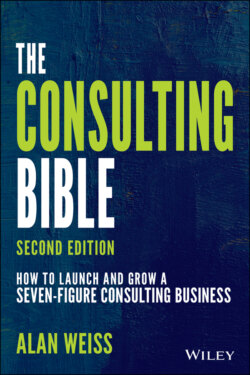Читать книгу The Consulting Bible - Alan Weiss - Страница 32
The Gospel
ОглавлениеA staff is not important unless you need it to help you walk up a long and winding road seeking enlightenment. And that's true only if you have a bad hip.
Most virtual assistants require supervision, and many of them don't represent you well, since they're representing another dozen or so people, as well. I warned one woman, in Toronto, who answered the phone for one of my mentor program members, that I would personally try to have her fired if she wasn't more polite when I called.
Also remember that full‐ and even part‐time employees often must be covered in the same benefit formulas and retirement plans that you implement for yourself and your family. And then there's illness, theft, personal problems, errors—do you really need these headaches? Most of us are refugees from larger organizations and the people management issues that thrive there, like mold in a damp cellar.
Here are six suggestions and resolutions:
1 Tuck your ego away. Having a staff doesn't elevate you in the eyes of the buyer. Telling someone your “people” will look into it will generate only levity.
2 Learn to do simple tasks efficiently. You should have invoice templates, sample proposals, automated expense statements, and so on. Use technology. Send clients or prospects letters from your laptop.
3 Learn to type, and I don't mean with your thumbs. I can type 60 words a minute, and so can you. If you can learn to use a keyboard, then you can learn to type on it. (I love the airline counter clerks who have been using keyboards for 20 years and never bothered to learn to touch type. It's not rocket science. These days, even rocket science isn't rocket science.)
4 Delegate and outsource. I use the following regularly:Automated voice mailGraphics designerBookkeeperPrinterAudio studioVideographerInternet expertsInternational limo companyAmerican Express travel servicesPostage and packaging suppliesFedEx and UPS accountsYou get the idea. These people and companies are available when you need them for fixed fees and rates (don't give them this book). I also make it a habit to pay local vendors such as my printer and designer first, because they are small businesses and always need the cash, and when I need a priority job they always put me at the top of their lists.
5 Shift work to the client. Your value is in results, not physical presence. Educate the buyer about how the client provides scheduling, administrative support for the project, security passes, parking, prompt reimbursement of expenses, internal follow‐up, and so forth. Make your work less labor intensive; don't design it to provide work for a staff of your own.
6 Hire people by the hour situationally. If you absolutely must, hire college students or community acquaintances (not friends!), or even part‐time employees from agencies for a few hours or a day to get volume work done. But that should be a last resort.
Early in your career, practice lean and mean. Later in your career, check for the bloat that often accretes to a growing, successful practice. I've counseled and coached consultants making $350,000 annually who have two full‐time and two part‐time employees! I run a business in excess of $3.5 million with no employees.
One of the interesting and common reasons for staffs to be hired is that the consultant has very strong affiliation needs that were once met by a larger, corporate (or intimate, small‐office) environment, but are now missing. The resolution for that is to find affiliation in other ways: civic responsibilities, socializing, professional associations, family gatherings, volunteerism, and pursuing hobbies with others.
In the worst case, if you don't have affiliation, get a dog. But don't get a staff. I love dogs and would do anything for them, but they've never cost me $450,000.
This last need leads me to a much more intangible but far more vital support requirement.
